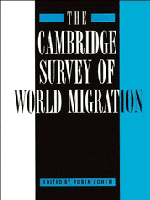Book contents
- Frontmatter
- Contents
- List of illustrations
- List of tables
- Notes on the contributors
- 1 Prologue
- 2 European colonization and settlement
- 3 Asian indentured and colonial migration
- 4 The great Atlantic migration to North America
- 5 Migration in Europe, 1800–1950
- 6 Migration in Africa
- 7 Latin and Central American migration
- 8 Migration to North America after 1945
- 9 Labour migration to western Europe after 1945
- 10 Repatriates and colonial auxiliaries
- 11 Migration in Asia and Oceania
- 12 Migration in the Middle East
- 13 Refugees from political conflict
- 14 Migrants and asylum-seekers in contemporary Europe
- 15 Emerging trends
- Acknowledgements and credits
- Index
5 - Migration in Europe, 1800–1950
Published online by Cambridge University Press: 05 December 2012
- Frontmatter
- Contents
- List of illustrations
- List of tables
- Notes on the contributors
- 1 Prologue
- 2 European colonization and settlement
- 3 Asian indentured and colonial migration
- 4 The great Atlantic migration to North America
- 5 Migration in Europe, 1800–1950
- 6 Migration in Africa
- 7 Latin and Central American migration
- 8 Migration to North America after 1945
- 9 Labour migration to western Europe after 1945
- 10 Repatriates and colonial auxiliaries
- 11 Migration in Asia and Oceania
- 12 Migration in the Middle East
- 13 Refugees from political conflict
- 14 Migrants and asylum-seekers in contemporary Europe
- 15 Emerging trends
- Acknowledgements and credits
- Index
Summary
Karl Marx was not alone in spotting that large-scale migration in Europe signified a momentous social transformation, though he was the first to draw from this process a general revolutionary theory. He dated the disintegration of the old order to the last third of the fifteenth century and the first few decades of the sixteenth. Then, peasant proprietorship collapsed and the glue that held early modern Europe together – the seigniories, monasteries and baronies – was dissolved. His language becomes quite extravagant in describing this period. This was the moment when ‘great masses of men [were] suddenly and forcibly torn from their means of subsistence and hurled onto the labour-market’ (Marx 1976: 876). Again, ‘The process of forcible expropriation of the people received a new and terrible impulse from the Reformation. … The dissolution of the monasteries, etc. hurled their inmates into the proletariat’ (p. 881). Finally, quoting W. T. Thornton, Marx concludes that ‘the English working class was precipitated without any transitional state from its golden age to its iron age’ (p. 879).
With the collapse of the socialist experiments of the twentieth century it has now become de rigueur to ignore Marx's writings. However, where he is wrong he is gloriously wrong – in a way that permits counter-arguments to be made and new insights to develop. Because Marx saw the migratory process as sudden and violent, he inferred that a new, reactive and unwavering form of working-class consciousness would emanate in the towns and factories to challenge the emerging capitalist order.
- Type
- Chapter
- Information
- The Cambridge Survey of World Migration , pp. 123 - 158Publisher: Cambridge University PressPrint publication year: 1995



